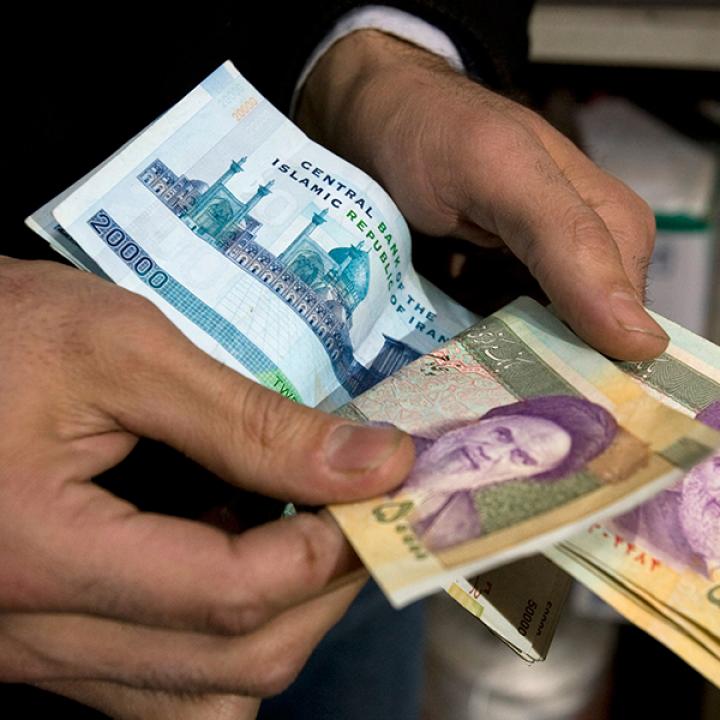
- Policy Analysis
- Articles & Op-Eds
On Iran Sanctions, Mixed News -- and Warnings for Potential Investors

U.S. Treasury officials will no doubt remind their European hosts this week about the need to continue countering Iranian terror financing, but some officials and businesses may not want to hear the message.
The head of the Treasury Department's Office of Terrorism and Financial Intelligence is in Europe to discuss joint counterterrorism finance efforts and where things stand with the global agreement on Iran's nuclear program. Talks on the former will be straightforward enough, but the latter could get bumpy.
Over the past few months, investors from Europe and Asia have gone to Tehran in droves, searching for post-sanction deals and bolstering Iranian hopes that the lifting of international sanctions will draw significant investment. According to an August 1 New York Times report, some in Europe have described Iran "as 'an El Dorado' and potential 'bonanza.'" And the Financial Times quoted the chief of Iran's central bank citing the country's "unique geographical advantage," its "sense of timeliness and discipline," and "very good history of being a trade partner." In October, he predicted that "Iran will be a very favored destination for many international investors."
But Treasury officials bear mixed news: The U.S. is preparing to meet its commitments on sanctions relief tied to implementation of the nuclear deal. Still, many U.S. sanctions tied to Iran's support for terrorism, human rights abuses, and other negative behaviors remain in place.
And within days of the Iranian central banker's comments in October, the Financial Action Task Force, which sets global standards on countering money laundering and terrorist financing, issued another searing rebuke of Iran's "strategic deficiencies." Only Iran and North Korea, the task force said, present such "on-going and substantial money laundering and terrorist financing" risks that the international community should apply active "counter-measures" to protect the global financial system.
The task force said that as sanctions are being lifted under the nuclear agreement, it "remains particularly and exceptionally concerned about Iran's failure to address the risk of terrorist financing and the serious threat this poses to the integrity of the international financial system." It repeated its long-standing call for financial institutions to "give special attention to business relationships and transactions with Iran, including Iranian companies and financial institutions."
In addition, the task force called on financial jurisdictions "to apply effective counter-measures to protect their financial sectors from money laundering and financing of terrorism" risks emanating from Iran, and warned that "jurisdictions should consider the steps already taken and possible additional safeguards." In other words, despite progress under the nuclear agreement, now is not the time to invest in Iran but to reassess whether safeguards against Iranian risks need to be strengthened.
Investing in developing markets carries standard risks; in Iran's case, those include rampant political and business corruption. Then there is the risk, accounted for in the global framework agreement, that if Iran violates the deal, "snap-back" sanctions will be triggered. But there are additional risks to doing business in Iran even after implementation of the nuclear deal begins: the risk of violating existing sanctions and the reputational risks of doing business with entities involved in sponsoring terrorism, abusing human rights, and engaged in illicit financial conduct such as money laundering.
Treasury sanctions focused on Iran's support for terrorism and human rights abuses remain in effect, including secondary sanctions affecting companies outside of U.S. jurisdiction. Iran's sponsorship of terrorism remains "undiminished," according to the 2014 State Department report on terrorism. More than 200 companies and individuals linked to Iran remain designated over illicit conduct, and secondary sanctions remain in place for the Islamic Revolutionary Guard Corps, whose increasing control over Iran's economy makes investing there particularly problematic. The National Iranian Oil Company is an "agent or affiliate" of the guards, the Treasury has determined. It is nearly impossible to engage in business in Iran without doing business with the IRGC in one form or another. The sanctions and reputational risks are all the more difficult to navigate because the IRGC uses front companies to mask its involvement from regulators and compliance officers.
Shortly after the Nov. 13 terror attacks in Paris, G-20 leaders stressed the group's commitment to "tackling the financing channels of terrorism" and the importance of "swift implementation of Financial Action Task Force (FATF) standards in all jurisdictions." In essence, European governments have already committed to acting on an aspect of the message Treasury officials are delivering this week, though it is one that some European officials and businesses may not want to hear.
Matthew Levitt is the Fromer-Wexler Fellow and director of the Stein Program on Counterterrorism and Intelligence at The Washington Institute. This article originally appeared on the Wall Street Journal blog "Think Tank."
Wall Street Journal



